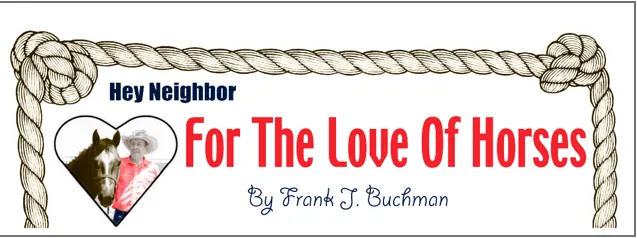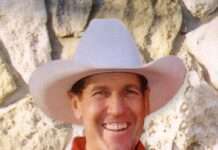By Frank J. Buchman
“Patience is the most important part of training horses.”
Tim McQuay was emphatic and repetitious in that point during his half dozen presentations as one of a handful of featured clinicians at the EquiFest of Kansas over the weekend in Topeka.
“Most horses can only learn one thing at a time. You have to have patience for a horse to learn that, before asking for more,” said the renowned Tioga, Texas, reining horse trainer.
“It’s a job that takes ages, time and time again before a horse can figure something out, knows what is expected, and then will naturally do it right,” continued McQuay mounted on a seasoned palomino Quarter Horse.
When a horse becomes resentful, he’s probably tired, or hurting. “Just leave him alone for a while. He needs a few days off, turn him out, let his mind clear up. Then, get him back in, and he’ll often be a completely different horse, like the lightbulb came on,” insisted McQuay, National Reining Horse Association Hall of Fame inductee, who has shown many futurity and derby champions earning literally millions of dollars.
Time off allows a horse to get over soreness that can develop during training. But sometimes, there are muscle strains and other injuries affecting the horse’s mind and performance that will take longer to heal and require additional care, McQuay clarified.
“Every horse is different, just like every rider is different. Some horses learn faster than others. It’s not how fast we get one trained, but how he performs when we get done,” McQuay emphasized.
Horses, in training at McQuay’s, are typically ridden five days a week, about 45 minutes at each saddling. “They need their days off, just like any other worker does,” McQuay said.
Breeding, reining and hunter-jumper horses, more than 200 horses in all are at McQuay Stables’ three properties in the heart of North Texas horse country.
McQuay and his wife, Coleen, distinguished hunter-jumper trainer, keep an average of 80 horses in training at all times. A fulltime staff of 25 employees assists in operations.
While reining is McQuay’s personal interest these days, horses are trained for a variety of disciplines, perhaps most importantly “just riding horses.”
“We train horses of all ages and all levels of ability, but it’s best to start a horse riding in the spring of their two-year-old year. Then build on a foundation, so we know exactly where the horse has been,” said McQuay, as an assistant trainer mounted on a three-year-old sorrel Quarter Horse demonstrated various riding techniques.
“Everybody is getting better, so we have to get better, too,” McQuay stated.
Go and stop, and be under control in between, are the simplified basics of training.
A horse has to move, but the stop is just as important. “Whoa means stop, and we reinforce voice command verbally, with hands and seat, until when the horse hears ‘whoa,’ he stops, whatever gait,” McQuay said.
“We use draw reins with a snaffle bit starting our horses to get control of their face and mouth for poll response and to help direct their body forward in a straight line,” McQuay said.
Horses are generally in the correct lead naturally, according to the direction of travel, but that isn’t always the case with a rider on their back. “We spend a lot of time working on leads, riding a horse straight across the diagonal of the arena, changing leads back and forth upon command,” explained McQuay, as his assistant demonstrated.
“Horses know how to turn, but doing it pretty when asked takes time. We start slow getting a horse to cross over the front legs, and build on the good habit. It doesn’t matter which pivot foot is used initially, they have to turn first, and then correctly,” McQuay said.
When a horses does what is expected it’s essential to reward him, a kind word, a soft rub, rest.
“Whatever you do, don’t crucify a horse when he makes a mistake. Just start over and go again. It takes time, believe me,” McQuay said.
Remembering when horses were expected to do every event, McQuay breeds horses specifically to excel in reining, but they can be ridden in diverse disciplines, he said. “We’re fortunate to raise many of the horses that we show. We’ve ridden horses with these bloodlines through several generations and have a good idea how they will perform.”
“Our first priority has always been about keeping the horses healthy and happy,” he said.
From birth through all stages of training, horses at McQuay Stables are fed carefully formulated diet to be in good flesh, individually evaluated for fitness and condition.
“We try to make the training process simple, so the horses enjoy what they’re doing and we as riders enjoy it more, too,” McQuay concluded.



